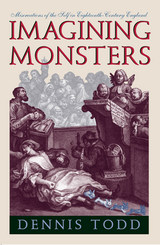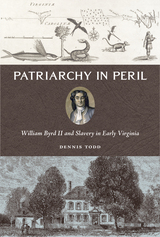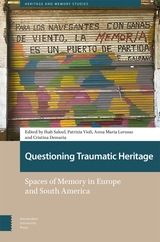2 books by Todd, Dennis

Imagining Monsters
Miscreations of the Self in Eighteenth-Century England
Dennis Todd
University of Chicago Press, 1995
In 1726, an illiterate woman from Surrey named Mary Toft announced that she had given birth to seventeen rabbits. Deceiving respected physicians and citizens alike, she created a hoax that held England spellbound for months. In Imagining Monsters, Dennis Todd tells the story of this bizarre incident and shows how it illuminates eighteenth-century beliefs about the power of imagination and the problems of personal identity.
Mary Toft's outrageous claim was accepted because of a common belief that the imagination of a pregnant woman could deform her fetus, creating a monster within her. Drawing on largely unexamined material from medicine, embryology, philosophy, and popular "monster" exhibitions, Todd shows that such ideas about monstrous births expressed a fear central to scientific, literary, and philosophical thinking: that the imagination could transgress the barrier between mind and body.
In his analysis of the Toft case, Todd exposes deep anxieties about the threat this transgressive imagination posed to the idea of the self as stable, coherent, and autonomous. Major works of Pope and Swift reveal that they, too, were concerned with these issues, and Imagining Monsters provides detailed discussions of Gulliver's Travels and The Dunciad illustrating how these writers used images of monstrosity to explore the problematic nature of human identity. It also includes a provocative analysis of Pope's later work that takes into account his physical deformity and his need to defend himself in a society that linked a deformed body with a deformed character.
Mary Toft's outrageous claim was accepted because of a common belief that the imagination of a pregnant woman could deform her fetus, creating a monster within her. Drawing on largely unexamined material from medicine, embryology, philosophy, and popular "monster" exhibitions, Todd shows that such ideas about monstrous births expressed a fear central to scientific, literary, and philosophical thinking: that the imagination could transgress the barrier between mind and body.
In his analysis of the Toft case, Todd exposes deep anxieties about the threat this transgressive imagination posed to the idea of the self as stable, coherent, and autonomous. Major works of Pope and Swift reveal that they, too, were concerned with these issues, and Imagining Monsters provides detailed discussions of Gulliver's Travels and The Dunciad illustrating how these writers used images of monstrosity to explore the problematic nature of human identity. It also includes a provocative analysis of Pope's later work that takes into account his physical deformity and his need to defend himself in a society that linked a deformed body with a deformed character.
[more]

Patriarchy in Peril
William Byrd II and Slavery in Early Virginia
Dennis Todd
University of Tennessee Press, 2023
William Byrd II was a prominent eighteenth-century Virginian who at the time of his death owned over 180,000 acres and employed laborers and enslaved Africans to work his land. His letters, diaries, and surveying documents have become key texts in the study of American history, and he is one of the most quoted and discussed figures of his era.
Byrd himself was perhaps the early colonial epitome of a patriarch, and typically, when historians examine Byrd and the prominence of patriarchal thought in colonial Virginia, they examine his relationships with his immediate family. In this book, however, Dennis Todd examines the patriarchal relations between Byrd and the workers on his plantations—his apprentices, his wageworkers, his overseers, his white servants, and especially his slaves. In doing so, this book illuminates a neglected stage in the formation of slavery in Virginia. Todd argues that patriarchal principles, which are often assumed to have justified slavery and to have offered a template for slave management, in fact did neither. Byrd was not the only Virginian to wrestle with the contradictions between patriarchal values and the realities of slavery, but few were as articulate.
In examining Byrd through the twin lens of slavery and patriarchy, Patriarchy in Peril makes an important contribution to our understanding of the man and his place in Virginia society as well as the contentious formation of early America.
Byrd himself was perhaps the early colonial epitome of a patriarch, and typically, when historians examine Byrd and the prominence of patriarchal thought in colonial Virginia, they examine his relationships with his immediate family. In this book, however, Dennis Todd examines the patriarchal relations between Byrd and the workers on his plantations—his apprentices, his wageworkers, his overseers, his white servants, and especially his slaves. In doing so, this book illuminates a neglected stage in the formation of slavery in Virginia. Todd argues that patriarchal principles, which are often assumed to have justified slavery and to have offered a template for slave management, in fact did neither. Byrd was not the only Virginian to wrestle with the contradictions between patriarchal values and the realities of slavery, but few were as articulate.
In examining Byrd through the twin lens of slavery and patriarchy, Patriarchy in Peril makes an important contribution to our understanding of the man and his place in Virginia society as well as the contentious formation of early America.
[more]
READERS
Browse our collection.
PUBLISHERS
See BiblioVault's publisher services.
STUDENT SERVICES
Files for college accessibility offices.
UChicago Accessibility Resources
home | accessibility | search | about | contact us
BiblioVault ® 2001 - 2024
The University of Chicago Press









